Budget 2016: Low-paid workers to receive savings bonus
- Published
- comments

Millions of low-paid workers who put aside savings could receive a top-up of up to £1,200 over four years, the government has announced.
Employees on in-work benefits who put aside £50 a month would get a bonus of 50% after two years - worth up to £600.
That could then be continued for another two years with account holders receiving another £600.
But Labour said the scheme was "like stealing someone's car and offering them a lift to the bus stop".
Owen Smith, the shadow work and pensions secretary, added the plans were "almost identical" to the 'Saving Gateway' drawn up by Labour when it was last in power.
In 2010 Chancellor George Osborne dropped the Labour scheme, which also matched 50p in every pound of savings from low-income workers, saying at the time that it was "not affordable".
'Help to Save'
Mr Smith said subsequent cuts to benefits would mean "families are going to struggle to have enough money to make it to the end of the week, let alone save for the future".
But Skills Minister Nick Boles said the scheme, known as "Help to Save", and a higher national minimum wage would help low-income families.
Mr Boles told the BBC's World At One: "This is a more generous incentive scheme than the old Saving Gateway that the last Labour government had."
Unlike the Labour scheme, "Help to Save" is available for four years rather than two, and is open to workers earning up to £30,000 a year, according to the Resolution Foundation, external.
The government also announced the national minimum wage would increase from October 2016.
Spending cuts
The measures will be detailed in this week's Budget, in which Mr Osborne has already warned of further spending cuts.
He said that the UK had to "act now rather than pay later" and that the UK would see cuts "equivalent to 50p in every £100" of public spending by 2020, which was "not a huge amount in the scheme of things".
Labour shadow chancellor John McDonnell called for more long-term investment, specifically in skills, infrastructure and new technology, to enable the UK economy to "withstand the global headwinds".
Forecasters at the EY Item Club said Mr Osborne should "hold fire" on further spending cuts or risk worsening an expected slowdown in the UK economy.
Chancellor George Osborne: "We need to act now, so we don't pay later"
'Extra support'
The government said that research showed almost half of UK adults had less than £500 set aside for emergencies.
It said the "Help to Save" scheme would be open to around 3.5 million adults who received universal credit or tax credit. They would be able to withdraw the money if necessary and there would be no restrictions to how it could be used.
If the maximum amount was paid in to the scheme over four years, it would mean savings of £3,600, with £1,200 coming from the government.
Prime Minister David Cameron said: "I've made it the mission of this government to transform life chances across the country.
"That means giving hard-working people the extra support they need to fulfil their potential."
The saving accounts will come into effect by April 2018 , with consultations on how exactly it will be implemented to begin shortly after the Budget.
David Finch, senior economic analyst at the Resolution Foundation, said: "It's vital that families have savings to fall back on to cope with financial shocks, but far too many low earners are unable to save at all. The new Help to Save scheme will provide a good incentive to start."

Case study: Lianne Walsh, Port Talbot
I am currently able to save around £7 a week in my credit union account. But often have to take it out to pay larger monthly bills.
All in all I struggle massively to make ends meet from week to week and there is no way I'd be able to save and keep those savings in an account continuously through the year.

Analysis

By Chris Mason, BBC political correspondent
With Westminster gripped by EU referendum fervour, David Cameron's focus today is a reminder of what he'd like his final years as prime minister to be remembered for: what he called "an all-out assault on poverty" in his party conference speech last autumn.
But how do you encourage people without much money to save money? How many of the 3.5 million people eligible to take part in the scheme actually will?
I asked the government for their prediction - and they wouldn't tell me. But it did say it would cost an estimated £70m to the taxpayer over the first two years.
So let's, very roughly, play with that figure.
Let's imagine the average participant can afford to put aside £10 per month. That would entitle them to £120 from the government after two years.
£70m pounds would allow ministers to give just under 600,000 people £120 - or one in six of those entitled to join the scheme.

Minimum wage
The new levels of the national minimum wage were also announced.
For 21 to 24-year-olds it will rise from £6.70 to £6.95 an hour, while 18 to 20-year-olds will see it go up from £5.30 to £5.55 an hour.
For 16 to 17-year-olds it will increase from £3.87 to £4 an hour, while apprentices will receive a 10p increase to £3.40 an hour.
Under the National Living Wage, announced last year, workers over 25 will receive a minimum of £7.20 an hour from April.
- Published14 March 2016

- Published14 March 2016

- Published13 March 2016

- Published11 March 2016

- Published12 March 2016
